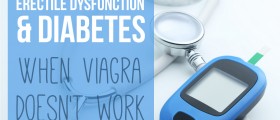
Erectile dysfunction, sometimes referred to as impotence, is a condition that can affect men of all ages. It represents the inability of the affected individual to achieve and also sustain a firm enough erection in order to perform well and manage to go through the entire sexual activity.
Normally, an erection is initiated by sexual stimulation. This generates electrical impulses that travel along the penis and lead to the release of certain chemicals. These chemicals are essential for the relaxation of the smooth muscles of the corpora cavernosa, and they facilitate rapid blood flow into the organ. Once the blood fills the corpora cavernosa, the penis expands.
What is Necessary for an Erection?
In order for a man to achieve an erection, his nervous system must be working impeccably. Nerve impulses must be transmitted efficiently throughout the nervous system including the brain, spinal cord, and the penis. Furthermore, the arteries of and near the corpora cavernosa must be healthy. Also, smooth muscles and fibrous tissues within the corpora cavernosa must be also healthy and functioning well. Finally, there can be no proper erection unless the level of nitric oxide in the penis is optimal.
Causes of Erectile Dysfunction
Aging is one of the most common causes of erectile dysfunction. The explanation is simple. Namely,, older men are more prone to different medical conditions, some of which may initiate erectile dysfunction. What is more, the very process of aging affects the corpora cavernosa in such a way that tissues of the organ lose their elasticity and its arteries do not expand as well as they used to. Also, the level of nitric oxide is often significantly decreased in elderly individuals.
Erectile dysfunction is closely connected to certain medical conditions. It, for instance, affects people who are suffering from diabetes mellitus, hypertension and cardiovascular disease. All these conditions are associated with atherosclerosis which may also affect the arteries in the penis, not allowing proper blood supply to the organ. Diabetes is responsible for damage to sensory and autonomic nerves which may contribute to this medical issue.
Damage to the spinal cord as well as nerves in the pelvis may be another cause of erectile dysfunction. Such damage may develop as a consequence of some diseases, trauma or is a side effect of surgery.
Men who are prone to substance abuse (marijuana, heroin, cocaine etc.) as well as heavy drinkers and alcoholics have decreased levels of testosterone. Testosterone is a male hormone of major importance for maintaining optimal levels of nitric oxide levels in the body. Therefore, all the mentioned bad habits may contribute to erectile dysfunction.
Cigarette smoking is a risk factor for atherosclerosis and this process is already mentioned as a cause of erectile dysfunction.
Erectile dysfunction may develop as a result of taking certain medications which are taken for chronic illnesses. Hydrochlorothiazide, digoxin, famotidine, phenytoin, gemfibrozil and many more may cause erectile dysfunction as one of their side effects.
Finally, under certain circumstances erectile dysfunction may affect people suffering from a variety of psychological disorders and emotional issues, including significant levels of stress. This is the explanation why men who have low self-esteem, feel depressed and anxious as well as those with post-traumatic stress disorder may end up having problems achieving erection.
Men who have noticed that they have started to develop difficulty in maintaining or gaining an erection would be advised to talk to their doctor. In some cases, an underlying medical issues which you were not aware of may be identified; treating it can also help you eliminate erectile dysfunction. In other cases, you could discuss lifestyle changes and even medical solutions to the problem. Do not be embarrassed to seek medical help — this condition is incredibly common, and your doctor can only help you.















_f_280x120.jpg)

Your thoughts on this
Loading...